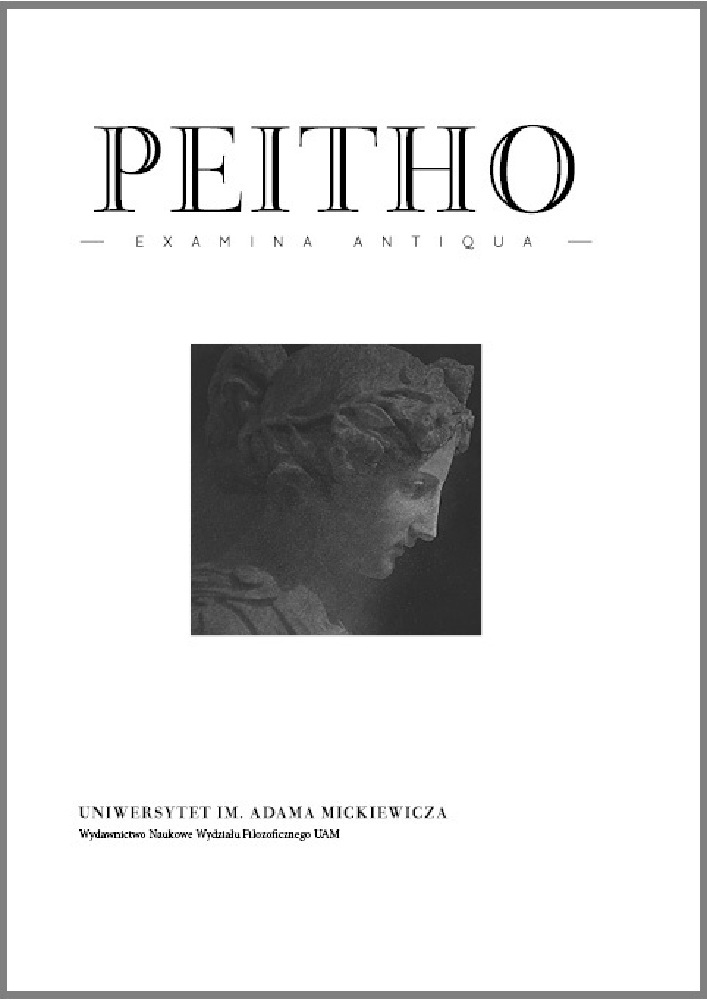Abstract
This article intends to characterize the constructive function that the Indeterminate Duality may have played in Plato’s oral teaching. Far from being in itself – as some testimonia seem to suggest – the primary origin of evil, as origin of multiplicity the Indeterminate Duality can be perceived as intrinsically presupposed by Plato’s identification of the source of being with the supreme Good. The notion of good implicates for Plato namely an unconditioned impulse to relationality, which indicates that the supreme Good is to be considered as supreme origin not only of unity, but also of multiplicity (scil. non-unity) and alterity. In the absence of multiplicity and alterity, no real relation, and, therefore, no real manifestation of the Good could in fact take place. As a consequence (and in accord with the suggestions given by Simplicius), the Indeterminate Duality may be considered as source of that original differentiation as well as of that generativity without which the supreme Good would be discordant with its goodness.
References
Baumgartner, H.M., 1965, “Von der Möglichkeit, das Agathon als Prinzip zu denken. Versuch einer transzendentalen Interpretation zu Politeia 509 b”, in: K. Flash (hrsg.), Parousia. Studien zur Philosophie Platons und zur Problemgeschichte des Platonismus. Festgabe für J. Hirschberger, Frankfurt am Main, pp. 89–101.
Candiotto, L., 2015, Senza dualismo. Nuovi percorsi nella filosofia di Platone, Milano e Udine.
Erler, M., 2007, Platon, Basel.
Gaiser, K., 1968, Platons ungeschriebene Lehre. Studien zur geschichtlichen und systematischen Begründung der Wissenschaften in der Platonischen Schule, Stuttgart.
Halfwassen, J., 1993, “Speusipp und die mataphysische Deutung von Platons Parmenides”, in: L. Hagemann, R. Glei (hrsg.), Hen kai plêthos. Einheit und Vielheit. Festschrift für K. Bormann, Würzburg e Altenberge, pp. 339–373.
Halfwassen, J., 1997, “Monismus und Dualismus in Platons Prinzipienlehre”, Bochumer Philosophisches Jahrbuch für Antike und Mittelalter 2, pp. 1–21.
Krämer, H.J., 1959, Arete bei Platon und Aristoteles. Zum Wesen und zur Geschichte der platonischen Ontologie, Heidelberg 1959.
Krämer, H.J., 1969, “Epékeina tês ousías. Zu Platon Politeia 509 b”, Archiv für Geschichte der Philosophie 51, pp. 1–30.
Krämer, H.J., 2001, Platone e i fondamenti della metafisica, Milano.
Lavecchia, S., 2005, “Idéa toû agathoû-agathòn epékeina tês ousías. Überlegungen zu einer platonischen Antinomie”, Bochumer Philosophisches Jahrbuch für Antike und Mittelalter 10, pp. 1–20.
Lavecchia, S., 2006, Una via che conduce al divino. La homoiosis theo nella filosofia di Platone, Milano.
Lavecchia, S., 2010, Oltre l’Uno ed i Molti. Bene ed Essere nella filosofia di Platone, Milano e Udine.
Lavecchia, S., 2012, “Agathologie. Denken als Wahrnehmung des Guten oder: Auf der Suche nach dem offenbarsten Geheimnis”, Perspektiven der Philosophie 38, pp. 9–45.
Lavecchia, S., 2012a, “Agathologie oder Henologie? Platons Prinzipienphilosophie jenseits von Monismus und Dualismus”, in: U. Bruchmüller (hrsg.), Platons Hermeneutik und Prinzipiendenken im Licht der Dialoge und der antiken Tradition. Festschrift für Th.A. Szlezák zum 70. Geburtstag, Hildesheim e Zürich e New York, pp. 363–382.
Lavecchia, S., 2015, Generare la luce del bene. Incontrare veramente Platone, Bergamo.
Luchetti, C., 2014, Tempo ed Eternità in Platone, Milano e Udine.
Mouroutsou, G., 2010, Die Metapher der Mischung in den platonischen Dialogen Sophistes und Philebos, Sankt Augustin.
Richard, M.D., 1986, L’enseignement oral de Platon, Paris.
Robin, L., 1908, La théorie platonicienne des Idées et des Nombres d’après Aristote, Paris.
License
Peitho provides immediate open access to its content on the principle that making research freely available to the public supports a greater global exchange of knowledge.
